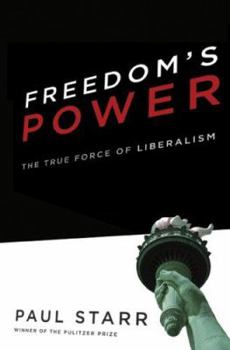Freedom's Power: The True Force of Liberalism
Select Format
Select Condition 
Book Overview
Liberalism in America is under siege. Conservatives now treat it as an epithet and even some progressives spurn it. But according to Paul Starr, liberalism is a sturdy public philosophy, deeply rooted... This description may be from another edition of this product.
Format:Hardcover
Language:English
ISBN:046508186X
ISBN13:9780465081868
Release Date:April 2007
Publisher:Basic Books (AZ)
Length:276 Pages
Weight:1.25 lbs.
Dimensions:1.0" x 6.5" x 9.4"
Customer Reviews
2 ratings
A New Definition of Liberalism
Published by Thriftbooks.com User , 16 years ago
This is a book you would not want to read if you are either sleepy or distracted. The first part is very dense and abstract. The author goes from general concept to general concept without giving any historical support or citing other works that support his theoretical claims. However, toward the end, he comes down to earth with a more fleshed-out and partisan message that sees little good in Repubicans, especially the Bush administration. He tries to build the case that only Democrats, who are the true liberals, can save the country. Paul Starr is not only a professor of sociology and politics at Princeton, he is also one of the founding members of " The American Prospect." On the political spectrum, that would place him to the left of "The New Republic" and to the right of "The Nation." In this book, he attempts to rehabilitate modern liberalism from being a term of abuse. He traces its origins back to the 17th century. According to Starr, the first phase of liberalism was known as "classical liberalism" or "constitutional liberalism," forged by the Glorious Revolution in Britain and the American Revolution. In this phase liberals sought to contain state power in the name of individual liberty. A balanced constitution would guarantee rule of law and individual rights. It is from this historical milieu that conservatism also springs. They also trace their origins back to these two revolutions. (Read Michael Barone's Our First Revolution: The Remarkable British Upheaval That Inspired America's Founding Fathers.) It can be said that the Anglosphere as a whole can attribute its wealth and social capital to the discipline and power constitutional liberalism. Starr goes on to describe how, at the end of the 19th century, classical liberalism became "modern democratic liberalism." This phase of liberalism ushered in with the Progressive Movement. The reach of government expanded and continued to expand during the 20th century with the New Deal and the Great Society programs. The goal of the so-called Liberal Project was to make society more egalitarian through activist government. This was done by income redistribution, extending rights to women and blacks (rights were by definition universal but not in practice), and by "deregulting private life" (namely artistic and sexual liberation). There was a consevative backlash against this unprecedented government intrusion into the economic and private life. Conservatives sought to preserve the status quo, to "stand athwart history." Eventually, however, conservatives came to accept the civil rights movement and certain forms of freedom of expression, though they still have a problem with income redistribution. The crux of Starr's argument is that liberalism believes that an activist government is needed to further individual liberty. Conservatives, on the other hand, believe that liberty can best be achieved when government gets out of the way. This is the central back and forth of
The Grownups Speak (at long last)
Published by Thriftbooks.com User , 16 years ago
The greatest weakness of this book is also its greatest strength. Full of resentful fury at the ideologically based incompetence, irresponsibility, and felonious assaults on constitutional liberty that characterize the bush "administration", one might crave more stirring reading. One MIGHT be disappointed... Except, this is not a book for people who just want to be outraged. It is a well-crafted explanation of the development of "liberal" thinking AND ACTIONS starting from the late Enlightenment/early Industrial Revolution. This evolution involved many splits and transformations. But it also represents some coherent progression to a consensus that MAY actually be growing in power and acceptance. It should be required reading for citizenship . . . but that would be a naive, moralistic (as well as utterly unenforceable and counterproductive) requirement. It would also be contrary to democratic liberalism, as it has evolved. Still reading this book drove home several points. First, even without the current "presidential" disaster, we should never be complacent about our constitutional liberties and their economic, political, civic, and other structural underpinnings. Second, worthwhile progress takes lots of hard work, serious clear eyed thinking, and strategic compromises; its success and failure is measured more in decades than in years. Third, so much cynicism (along with so much idealism) is rooted in thoughts and feelings divorced from responsible experience. Not everyone will read this book. But I hope that many who do will work to use its examples and ideas to bring more citizens back into the political process. The stakes are very high. (I'm still gonna try to give less $$ to the Democrats and more to orgs like MOVEON)





